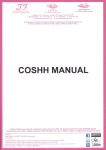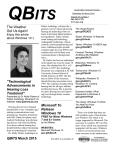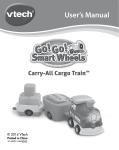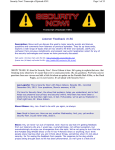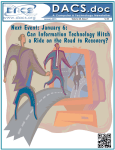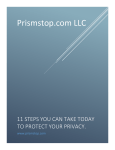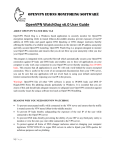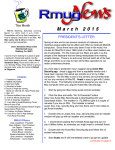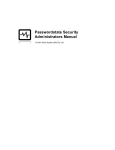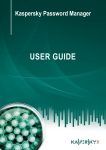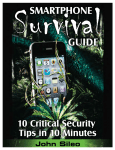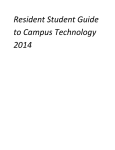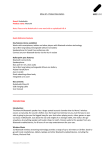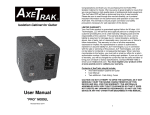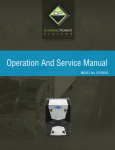Download Frequently Asked Questions
Transcript
Frequently Asked Questions How do I turn my computer on and off? in sleep mode than it is to start a computer that has been turned off. It depends on the type of computer. The user manual for your computer or the search function on your computer will tell you how to do it. However, leaving a computer on wastes electricity (even in sleep mode) and turning it off can help performance. Sleep is not the same as a shutdown. For computers using Windows, you should turn off your computer by clicking or tapping the Shutdown. The Restart button will turn it off and immediately back on. Installations of new programs or applications or similar changes often require at least a restart for full installation. If there are updates that are ready for installation, they will be installed when you shut-down a Windows PC but you should not push the power button during the installation of software updates. The computer will turn off when they are fully installed. FYI, these updates require a network connection (such as CCI-Resident). Do I need to turn off my computer when I am finished for the day? [Note that “computer” refers to desktops, laptops, tablets, and related devices.] The general advice from computer experts is to leave it on all day if you use it more than once a day. If you use it in the morning and at night, you can leave it on overnight, too. However, if you use your computer a few hours once a day or less, turn it off when you are finished. The advantages of leaving it on are that background updates and virus scans occur when the computer is running and it is easier to access a computer that is on or that has been hln2 v4 8/2/2015 Computers that are left on are susceptible to power surges after a loss of electricity and a sudden burst of energy when power is restored. (This is why surge protectors and battery back-ups are useful.) Is it important to keep a record of my usernames and passwords? It is essential. Lost or forgotten passwords are a common problem faced by the Tech Tutors. It is difficult Page 1 or impossible to teach people how to use email or a password-protected program without the password (and email address or username). Save usernames and passwords for all accounts on a pad or in a notebook and keep them in a secure and easily found location (near your computer). Address books and index cards and file boxes are useful storage places. Do not store secure information on your computer. You cannot get into email or other secure accounts without your username and password. For iPad users, it is essential that you remember your passcode to be able to use your device. If you do not have it, it may be necessary to reset you device back to its original settings, losing all that you have saved on it such as new applications, photos, and music. Password manager software is also available. Password managers offer an encrypted, searchable database. They can include things like form auto-fill, multi-device syncing, auto-password changes, and notifications when a site with which you have an account gets hacked. LastPass and 1Password works on Windows and Macs. KeePass works with Windows. [Follow the links by clicking on them or by holding down the Ctrl key and clicking.] Should I back-up my computer files and programs? All important files and programs should be backed up on an external hln2 v4 8/2/2015 device such as a flash or thumb drive, a CD, a DVD, or an external hard drive. You can also back up in the “Cloud,” which is a location in cyberspace. You may have to pay a fee to back up on the Cloud. You can choose to back specific files and programs or to back up your entire system. You can get more information about system back-ups from an Internet search, your computer manual, or a computer support person such as a Tech Tutor. Is an anti-virus program important? Yes. There are various ways that viruses and similar threats can infect your computer. You can use built-in anti-virus and firewall programs, such as Windows Defender, which are free. There are other programs with free versions, such as AVG, avast!, Malwarebytes, Norton, and McAfee. However, after a period of time, you are likely to see pop-ups on your machine encouraging you to buy the commercial version of these programs. Computer sales people may encourage you to buy an antivirus program, but you should consider free anti-virus software as an alternative. You should schedule regular virus scans in the scheduler in your program’s control panel. If you do the scans manually, you can do a “quick scan” about once a month and a full scan (which may take an hour or more). Page 2 Use Safe Computing Practices as outlined in the OnGuardOnline government website. How do I navigate my computer? An increasing number of computers today rely on touch screens and may have “virtual keyboards” that appear when you touch an area requiring the entry of text. Touch screen computers rely on a variety of gestures – e.g., swipes right or left or up or down, taps, or pushes to initiate actions or locate items. A stylus can help you touch more precisely and keep your display clear of fingerprints. Computers that do not have a touch capacity rely on a mouse or mouse pad. Left clicking usually initiates an action such as opening a program or web link and right clicking usually opens a menu for the item clicked. Consult the user guide for your machine to learn more about how to navigate it. What programs can I use for email? There are numerous choices, including Google Gmail; Microsoft Outlook Mail (in Windows 8 and 10); Hotmail (now owned by Microsoft); AOL; Yahoo!; Mozilla Thunderbird; and programs built into computers and devices such as the Amazon Kindle Fire, iPad; and WOW! Some programs give you the opportunity to sync with or link to other email programs, such as Google Gmail in Outlook Mail. How can I search the Internet for information and websites? hln2 v4 8/2/2015 You can use a browser such Apple Safari; Microsoft Internet Explorer or Edge; Mozilla Firefox; Google Chrome; or Android Silk to connect you to the Internet. You can use the web address line in browsers for searching for specific web sites or for information about specific topics. However, there are also search engines specifically focused on searching topics on the Internet, such as what a reference librarian does. The browser gets you on to the web and may help in your search, but the search engine concentrates on searching. The most popular search engines are Google; Bing; Yahoo!; Ask; and AOL Search. When you search the Internet, be careful what you click! Try to determine whether a web address is associated with an ad. Select search items with websites that are reputable and directly related to your search. Consult the OnGuardOnline.gov website for more information. Can I used my computer for phone calls and video calls? It depends on whether your computer has the hardware needed for such communication. Skype is a popular program for these purposes. To obtain more information, see the Skype website. The equivalent of Skype for Apple users is FaceTime. To learn more about it, see an Apple user guide. Click the link here for the pdf version of the iPad user guide. Page 3 Can I take and save photos on my computer? Does the CCI-Resident connection work for my wireless printer? Many computers have built-in cameras, which also may make Skype or FaceTime calls possible. Photos received in emails can be saved and edited on your computer. See the user manual for your computer for more information. There is a different portal for printers. It is called CCI-Portal. Special information about your printer will generally have to be provided to Charlestown Connect so that you connect your wireless printer to the Internet. What happens when I lose my network connection? When should I purchase a new computer and what type should I buy? Your monthly fee includes access to the Internet and phone service provided by Charlestown Connect. You initially need to set up your wireless connection (usually to CCI-Resident) for your computer by typing your username and password provided by Charlestown Connect into the authentication area for your network connection on your computer. If you cannot locate this information or need help with it, you can contact Charlestown Connect (1-800-6770211) for help by phone or from a technician who will come to your apartment and provide free assistance if you are a new resident. You can also contact Charlestown Tech Tutors (410-501-3572) for free assistance, which may involve calling Charlestown Connect. If you ask for help from Charlestown Connect with matters unrelated to your computer connection, you will have to pay. Tech Tutor assistance is always free and covers a range of instructional and software support services for computers and printers (see below). hln2 v4 8/2/2015 There are many reasons to buy a new computer. Frequently cited reasons are that the computer has become very slow or unreliable because components are wearing out; new programs or applications are not compatible with the operating system; and it is too costly to add memory or update the processor or operating system. There are a lot of choices. The most important advice is not to buy a computer with features you are unlikely to use. You may be paying more than necessary. If you only want to use your computer for accessing the Internet, emailing, and taking and saving photos, there are a number of inexpensive tablets that will meet your needs. If you want to do more, such as word processing, spreadsheets, presentations, edit videos or music, create graphics, play interactive games, or print documents, photos, and other items, you will want a laptop or desktop with more capacity than small tablets. Page 4 Consult the Internet for reviews, check Consumer Reports, and go to local computer stores to test products for yourself. Remember, though, if you get a “great deal,” you may have to be satisfied with fewer features, less speed, and less operational and storage capacity. The same general points apply to purchasing printers. What resources are available at Charlestown to help me with my computer or Internet device? 1. Contact Charlestown Connect for connection issues. 2. Contact Charlestown Tech Tutors for help with your software programs and for instruction in their use. (See phone numbers in a prior section.) Charlestown Tech Tutors is a group of resident volunteers who provide individualized in-home introductory-level education about computers to residents on request. Tech Tutor assistance includes such things as helping residents: (a) become comfortable enough with their computer to be able to use it for basic functions; (b) set up and learn to use email; (c) access the Internet; (d) search websites; (e) learn how to share photos; (f) manage their online address book or contacts, including accessing, adding, and deleting contacts; and (g) check the status of their anti-virus protection and give advice or suggestions about improving the performance of their computer. The service is FREE. hln2 v4 8/2/2015 3. Obtain a Tech Tutor Service Request Form by clicking this link and printing the form; by getting one at a service desk on the Charlestown campus; or by contacting Tech Tutors directly at 410-501-3572. If you call, please include your name, apartment number, and phone number in your message. 4. The Apple Charlestown Users Group (CHUG) meets the third Thursday of the month (except July, August, and December) to discuss Apple-related topics. Check the bulletin boards for meeting topics and days. The CHUG website also has the meeting information. 5. Charlestown also has a Computer Club and Computer Lab (which provides computer access for those who do not own computers or printers). See the Charlestown Community Resources Guide for more information. What off-campus and Internet resources are available to help me with my computer or Internet device? 1. For hardware repairs or replacements or other technical issues such as the removal of viruses, you can contact local tech stores such as the Apple Store, Staples, Best Buy (Geek Squad), and Office Depot, or MacMedics. 2. You can also find a wealth of helpful information on the Internet. You need to learn how to master Page 5 informed searching in which you enter appropriate search terms and discriminate between legitimate and useful sites and others. You should look at the web address (URL) and brief description next to most items in your search list for clues to the nature and value of websites. 3. Computer manufacturers no longer provide much paper documentation for their products, but they have online user manuals and many of them are free (if you type “free user manual for [name of product]”) into the search line of your search engine. 4. PCClassesonline has many free tutorials for both Windows, Mac and tablets, and the GCF Learn Free website has many useful tutorials. You can also find helpful information at the Net Literacy website. See the links for “Computer Basics,” “Email Basics,” “The Internet,” and “Social Networking Skills.” 5. Youtube.com has many beginner tutorials for computers, tablets, and smartphones. Just add the name of the device or software you are interested in learning about. hln2 v4 8/2/2015 Page 6






